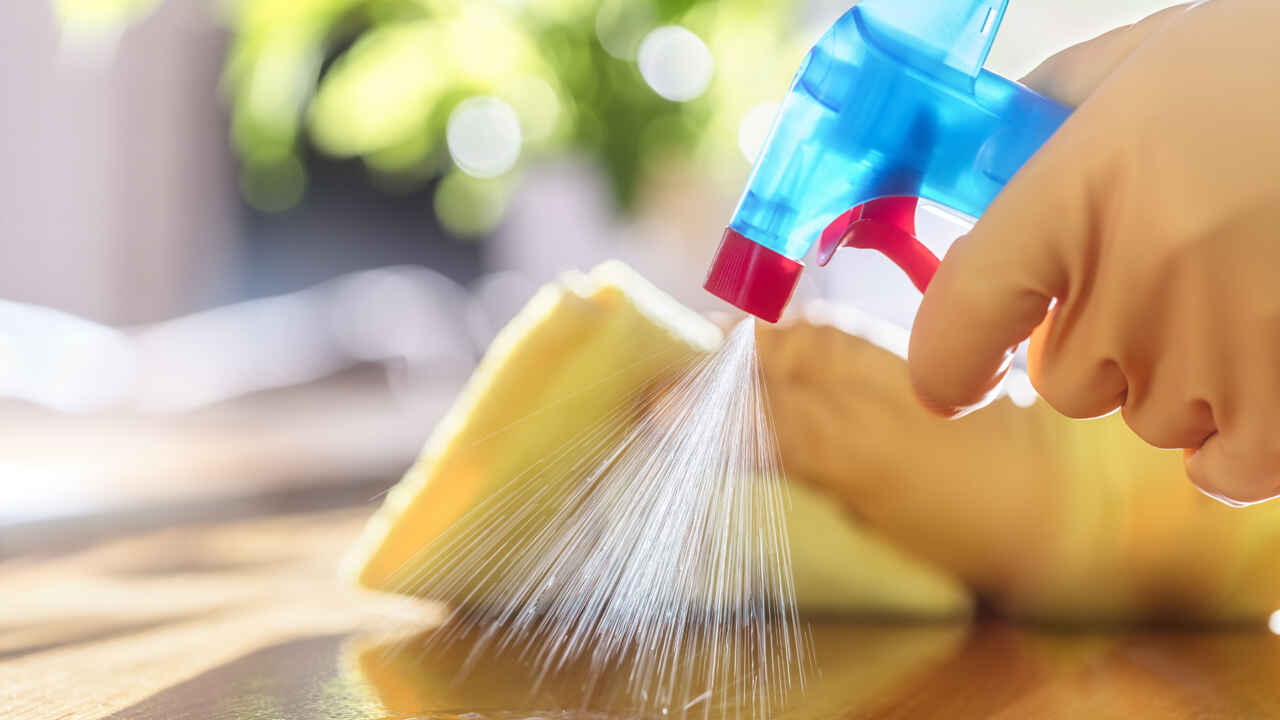 Cleaning hands and surfaces reduces exposure to germs, but here’s why you need to be careful.
Cleaning hands and surfaces reduces exposure to germs, but here’s why you need to be careful.
Keeping your hands and household surfaces clean helps protect you from COVID-19, but the products you use to keep everything clean may have a downside – they may also be the cause of accidental poisonings. Although anyone can be poisoned by cleaning products, young children and pets are particularly at risk.
Your Cleaning Habits Can Help or Harm Your Health
Coronavirus droplets travel through the air when an infected person breathes, talks, laughs, coughs or sneezes. If you touch a surface that has been contaminated by the virus from these droplets and then touch your nose, mouth or eyes, you may be more likely to get sick.
Frequent cleaning is a simple way to remove the virus from railings, doorknobs, phones, countertops and other frequently-touched surfaces. Unfortunately, the ingredients that kill the virus may also make someone sick if they accidentally swallow, breathe or lick the cleaner.
Early in the pandemic, there was a sharp increase in accidental poisonings resulting from cleaning products. Calls to U.S. poison control centers related to cleaning supplies and disinfectants increased by 20% in January through March 2020 compared to the previous year, according to a report from the Centers for Disease Control and Prevention. The largest increase in calls involved poisonings in children younger than 5.
7 Ways to Use Cleaning Products Safely
Keeping your home and hands clean, especially in the midst of a global pandemic, is important. But if you have young children or pets at home, it’s also important to be aware of the dangers these products may pose.
These tips help reduce the risk of accidental poisoning:
-
- Find a safe place to store cleaning products. Keep sprays, liquids, wipes and hand sanitizers on high shelves or in other places where children and pets can’t reach them. Place childproof latches on cabinets where cleaning products are stored.
- Throw away used products immediately. Place used cleaning wipes, empty bottles and paper towels saturated with cleaners in a trash can with a secure lid as soon as you finish using them.
- Don’t mix cleaners. Combining two or more types of cleaning products, even natural ones, can create dangerous fumes that can cause breathing difficulties, fainting or even death.
- Limit use of harsh cleaners. Scrubbing surfaces with soap and water creates friction that may be all that’s needed to remove lingering germs from surfaces. So instead of constantly using bleach and antibacterial cleaners, stick to soap and water when possible.
- Stay away from disinfectants until they dry. Coming in contact with wet disinfectants can cause skin irritation or may burn the mouth, eyes, nose, throat and lungs.
- Open a window. Use disinfectants in a well-ventilated area to reduce fumes.
- Keep products in original containers. It’s easier to avoid accidental poisoning if cleaning products are properly labeled.
What to Do if Poisoning Occurs
If you know or suspect that someone has swallowed or come in contact with a cleaning product or anything that can cause poisoning, call Poison Help at (800) 222-1222. Your call will be transferred to local poison control center employees who will tell you what you should do, depending on the type of poison and the means of exposure.
Call 911 immediately if the person is unconscious, struggling to breathe, agitated, having seizures or has stopped breathing.
Copyright 2021 © Baldwin Publishing, Inc. All rights reserved.
Health eCooking® is a registered trademark of Baldwin Publishing, Inc. Cook eKitchen™ is a designated trademark of Baldwin Publishing, Inc. Any duplication or distribution of the information contained herein without the express approval of Baldwin Publishing, Inc. is strictly prohibited.
Date Last Reviewed: January 14, 2021
Editorial Review: Andrea Cohen, Editorial Director, Baldwin Publishing, Inc. Contact Editor
Medical Review: Perry Pitkow, MD
Learn more about Baldwin Publishing Inc. editorial policy, privacy policy, ADA compliance and sponsorship policy.
No information provided by Baldwin Publishing, Inc. in any article is a substitute for medical advice or treatment for any medical condition. Baldwin Publishing, Inc. strongly suggests that you use this information in consultation with your doctor or other health professional. Use or viewing of any Baldwin Publishing, Inc. article signifies your understanding and agreement to the disclaimer and acceptance of these terms of use.